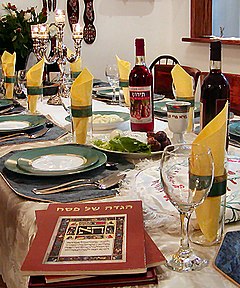
Back Pesach Afrikaans Pessach ALS عيد الفصح اليهودي Arabic عيد الفصح ARZ Pascua xudía AST Pesah Azerbaijani Песах Bashkir Pessach BAR Песах Byelorussian Пэсах BE-X-OLD
| Passoverחַג הַפֶּסַח | |
|---|---|
 A table set up for a Passover Seder | |
| Official name | Pesach – Hebrew: פסח, romanized: Pesaḥ |
| Type | Jewish (religious and cultural) |
| Significance |
|
| Celebrations | Passover Seder |
| Begins | 15 Nisan |
| Ends | 21 Nisan (22 Nisan in traditional Diaspora communities) |
| Date | 15 Nisan, 16 Nisan, 17 Nisan, 18 Nisan, 19 Nisan, 20 Nisan, 21 Nisan, 22 Nisan |
| 2023 date | Sunset, 5 April – nightfall, 13 April (8 days) |
| 2024 date | Sunset, 22 April – nightfall, 30 April (8 days) |
| 2025 date | Sunset, 12 April – nightfall, 20 April (8 days) |
| 2026 date | Sunset, 1 April – nightfall, 9 April (8 days) |
| Related to | Shavuot ("Festival of Weeks") which follows 49 days from the second night of Passover. |
Passover, also called Pesach (/ˈpɛsɑːx, ˈpeɪ-/;[1] Biblical Hebrew: חַג הַפֶּסַח, romanized: Ḥag hapPesaḥ, lit. 'Pilgrimage of the Passing Over'), is a major Jewish holiday for Rabbinical Judaism, Karaite Judaism, and Samaritanism, one of the Three Pilgrimage Festivals, that celebrates the Exodus of the Israelites from slavery in Biblical Egypt.[2]
According to the Book of Exodus, God commanded Moses to tell the Israelites to mark a lamb's blood above their doors so that the Angel of Death would pass over them: they would not be touched by the tenth Plague of Egypt, the death of the firstborn. After this Plague, Pharaoh ordered the Israelites to leave, taking whatever they wanted, and asked Moses to bless him in the name of God. The passage goes on to state that the Passover sacrifice recalls the time when God "passed over the houses of the Israelites in Egypt".[3]
This story is recounted at the Passover Seder by reading the Haggadah. The Haggadah is a standardized ritual account of the Exodus story, in fulfillment of the command "And thou shalt tell [Higgadata] thy son in that day, saying: It is because of that which the LORD did for me when I came forth out of Egypt."[4]
Pesach starts on the 15th day of the Hebrew month of Nisan, which is considered the first month of the Hebrew year. The Rabbinical Jewish calendar is adjusted to align with the solar calendar in such a way that 15 Nisan always coincides with Sunday, Tuesday, Thursday, or Saturday. The Hebrew day starts and ends at sunset, so the holiday starts at sunset the day before. For example, in 2024, 15 Nisan coincides with Tuesday, April 23. Therefore, Pesach starts at sundown on Monday, April 22.
The Samaritan calendar differs because it does not limit the days the festival can begin and it has a different set of intercalary months, so Passover coincides with the Rabbinical celebration, occurs two days later, or occurs a whole lunar month later. [5]
For Karaite Jews, the date of Passover is different. "Karaites rely on observations for the first day of the Hebrew-calendar month, when the crescent moon makes its first appearance. When there’s a discrepancy between the calendar and the first sighting, they ignore the former and treat the sighting as the true beginning of the month, dating any holidays in that month accordingly."[6]
Pesach or Passover can also refer to the Passover sacrifice, the paschal lamb that was offered when the Temple in Jerusalem stood; to the Passover Seder, the ritual meal on Passover night; or to the week-long Feast of Unleavened Bread. One of the biblically-ordained Three Pilgrimage Festivals, Passover is celebrated for seven days in Israel and eight days in the diaspora due to the principle of the yom tov sheni shel galuyot "the second festival day in the Diaspora". In the Bible, the seven-day holiday is known as the Feast of Unleavened Bread.[7]
The omer offering was offered at Jerusalem on the second day of the festival. The counting of the omer is still practiced for seven weeks until the 50th day, which is the holiday of Shavuot.
Nowadays, in addition to the biblical prohibition of owning leavened foods for the duration of the holiday, the Passover Seder, at which the Haggadah is read aloud, is one of the most widely observed rituals in Judaism.
- ^ "Pesach" Archived November 30, 2014, at the Wayback Machine. Random House Webster's Unabridged Dictionary
- ^ "What is Passover? – Learn All About the Passover Holiday". Tori Avey. March 4, 2012. Archived from the original on October 18, 2021. Retrieved October 18, 2021.
- ^ Exodus 12:27
- ^ "Exodus 13:8". Archived from the original on March 8, 2021. Retrieved April 7, 2021.
- ^ "The Samaritan Calendar". The Samaritans.
- ^ Lidor, Canaan (April 5, 2023). "As Karaites undergo a resurgence, why is their Passover different from all others?". The Times of Israel. Retrieved April 17, 2024.
- ^ "Pesach and Chag HaMatzot – A Two for One?". AlHaTorah.org. Retrieved April 11, 2022.
© MMXXIII Rich X Search. We shall prevail. All rights reserved. Rich X Search